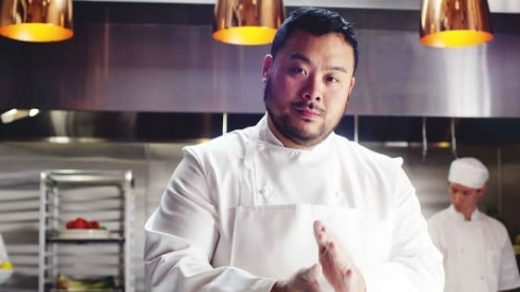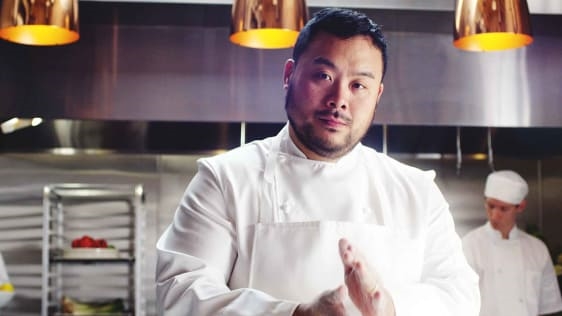How Creating A Food Doc Made Momofuku’s David Chang Less Judgmental
David Chang is at a turning point.
The celebrated chef behind Momofuku Noodle Bar, Má Pêche, Milk Bar, and a dozen other lauded outposts is no longer a rookie upstart challenging culinary conventions with his inventive approach to pork buns and ramen, but a 40-year-old married man whose empire chugs along smoothly even when he’s not slaving behind the stove.
“I get way too much credit for the restaurants,” Chang says. “They’re staffed with what I believe to be some of the best and brightest men and women in the business. Momofuku, I feel, is just a vehicle to give them an opportunity to express themselves. So that’s the way I look at it–we have a really good team that allows me to step away and do stuff.”
Amongst that “stuff” is a new Netflix documentary series, Ugly Delicious. Directed by Morgan Neville, the series follows Chang and a band of other chefs, foodies and writers–including former New York Times food critic Peter Meehan, Noma chef René Redzepi, and Kogi’s Roy Choi–as they debate everything from the cultural appropriation of tacos, to the effect of President Trump’s immigration policy on the food world, to whether liking Domino’s pizza makes you a lesser person. To get to the bottom of the latter and particularly divisive discussion, Chang dons a Domino’s jacket and delivers pies in order to better understand the magic spell that the corporate pizza behemoth has cast over Americans. (Spoiler alert: Chang is a Domino’s disciple.)
Each of the series’ eight episodes focusses on a simple food or concept–home-cooking, fried chicken, BBQ, pizza, etc.–and then dives down an exploratory rabbit hole on each subject.
But at the heart of the doc is Chang’s own coming-to-terms with himself as a chef and person who is less judgmental and more open to “multiple truths” as he puts it, e.g., it’s okay, he comes to realize, for non-Koreans to make a batch of kimchi. The series is also a window into how middle-age and Chang’s new domestic situation (he’s been married for a year) are affecting his life and work. Spending (slightly) more time away from his professional kitchen and more time in his own, he finds himself embracing home cooking–“or what I call ugly delicious food,” he says in the doc. “It’s the food that I now want to cook in the restaurant.”
“I’ve just reached a point where I’m okay making really ugly food,” he goes on. “I think it’s a mixture of age and me just coming into my own a little bit.”
Chang spoke with Fast Company about the new insights he gained from making Ugly Delicious and how it’s made him a better person and chef.
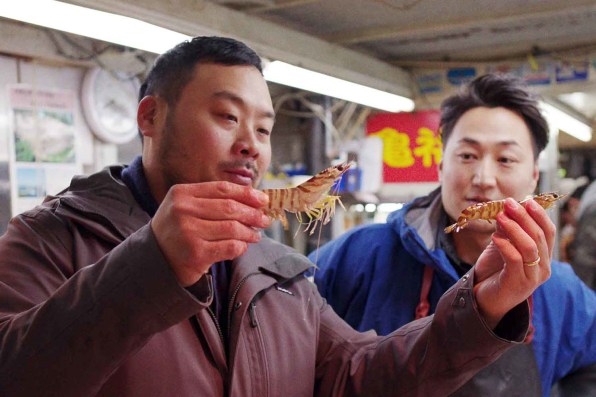
Chang in Ugly Delicious, 2018. [Photo: courtesy of Netflix]
EMBRACE MULTIPLE POINTS OF VIEW
Ugly Delicious asks a lot of philosophical questions like is it okay for outsiders to culturally appropriate ethnic cuisines? And what makes food “the best”? Is it the quality of the food itself or the experience that the diner derives from it? Chang says the best way to talk about, and understand, food is to not see anything in black and white terms. It’s better to ask questions and then accept there’s more than one right answer.
“We try to leave all the episodes open-ended,” he says. “We’re not trying to be prescriptive and tell the audience that they need to adhere to this viewpoint. Most importantly, we’re trying to be as empathetic as possible because a lot of these issues are wildly complex. And many, many things are true. And not to sound too fancy but it’s a very relative point of view, and food can be packed with cultural things that most people don’t talk about. And I think as a chef, being able to see points of view, that’s ultimately the biggest thing. If I can think very clearly how a diner might want to eat, that’s going to better serve me in my restaurant.”
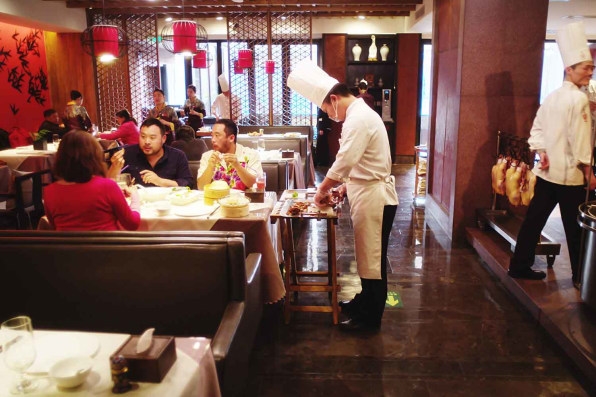
Delicious, 2018. [Photo: courtesy of Netflix]
RESERVE JUDGMENT
Chang’s growth as a chef has meant letting go of certain preconceived judgments. He says he is now more willing to accept people and practices that he once would have dismissed as offensive, making him more open to new ideas.
“You gotta let things play out,” he says. “And then have a dialogue. For example, one of the things I was critical of myself, and [The Wire creator] David Simon talks about it in the fried chicken episode, was people making kimchi. How I can’t let anyone else make kimchi. Or I can, but I don’t want someone who had no interest in it last week to suddenly, because they read about it, want to make kimchi. I want them to not only be respectful but I want them to understand why certain things are a certain way. But David Simon was absolutely correct. What makes America great is that we culturally appropriate better than anyone else. We are able to do it in a way that ultimately better serves people around us. And if you’re able to do that, that’s good.
“So instead of me chastising or internally criticizing someone because they just learned how to make kimchi and they put it on a menu, maybe the best thing I can do is let them continue to do it because if they do a good job of it and they like it, maybe they’re going to become an expert in it. And then through that, they’re going to understand Korean culture or Asian-American culture or cultures outside of their norm. The best example I can give is Andy Ricker [and his restaurant] Pok Pok. He grew up wanting to make Thai food and now he lives in Thailand. Sometimes you just gotta let it play out without pointing a finger at someone. And I think myself and everyone is to blame in that regard. It’s too easy to throw stones.”
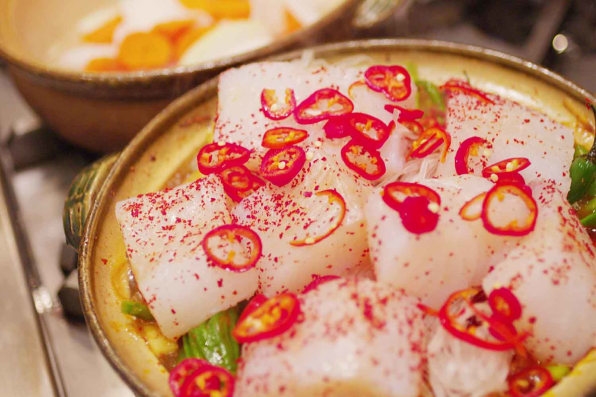
Delicious, 2018. [Photo: courtesy of Netflix]
POPULAR DOESN’T MEAN LESS THAN
The food world has no shortage of snobbery and pretentiousness. Being food savvy is a kind of cultural currency that plays out everywhere, from food truck lines to the hushed corners of Michelin-starred restaurants. But Chang argues for a more embracing approach to food, one that doesn’t automatically dismiss food that doesn’t come with all of the artisanal bells and whistles.
“You saw the pizza episode. If you grew up eating Domino’s or Papa John’s or something like that, and you never had the luxury of going to Naples or Japan, that doesn’t make you a philistine,” Chang says. “You might get to that point down the line, but at that moment in time, the best pizza in the world to you is Domino’s. It’s for the masses and it makes people happy. And if it makes someone happy, it doesn’t mean they’re less valid than someone who’s a pizza expert. There’s a certain nostalgia aspect to it.
“Just because something is popular and has mass appeal doesn’t mean it’s not awesome. In some ways, [making mass-scale pizza] is more difficult to do than to just make pizza for 50 people a day. And yes, you can have this giant conversation about love and care and the fact that Domino’s is this giant, corporate behemoth. But if you look at it on another level, it feeds a lot of people and a lot of people feel that Domino’s is great pizza. It shouldn’t be that if someone likes it, they’re not valid. I think comparing popular food with mass appeal to sort of the cool factor of certain esoterica food items–that’s a battle that can’t be won, but it’s interesting to talk about it because it’s really embracing the fact that multiple truths can happen at the same time.”
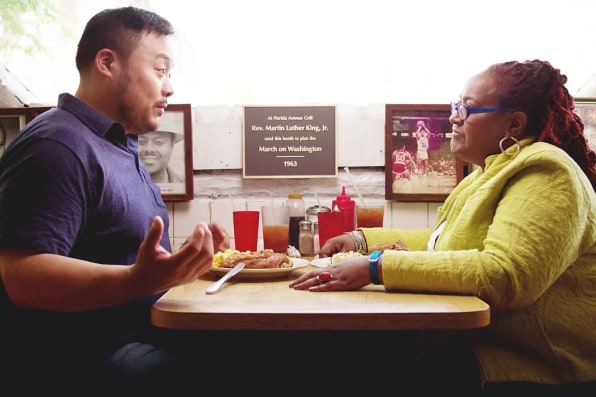
Delicious, 2018. [Photo: courtesy of Netflix]
USE A STORY TO RAISE AWARENESS
Ugly Delicious shines the light on high-profile chefs who have been affected by Trump’s anti-immigration laws, such as Cristina Martinez, an illegal Mexican immigrant who is the chef at South Philly Barbacoa. Chang says he’s not sure that food, or discussions around food, can affect national policy, but that by at least telling the story of people like Martinez, he hopes to give more context to a polarizing subject.
“At the very least, it just shows the human nature of all these decisions,” he says. “And we’re barely scratching the surface, but our profession is made up of immigrant workers. And if anything, I think what we try to convey is that it’s not a black and white issue. You can’t say this is good and that’s bad. It’s more nuanced. I don’t think we want anyone to say that this is the definitive answer on anything that we’re talking about. It’s simply to raise awareness and to have a conversation, and to arm yourself with more knowledge, and that’s it. Maybe someone’s not aware. Maybe someone reads about these issues, but they don’t know that the chef from Barbacoa in Philadelphia can’t go back home to see her daughter. Or the chef in Mexico City, Max, can’t go back to America. They didn’t do anything wrong. I think that’s hard. It’s just trying to show that there’s multiple truths.”
Fast Company , Read Full Story
(100)

